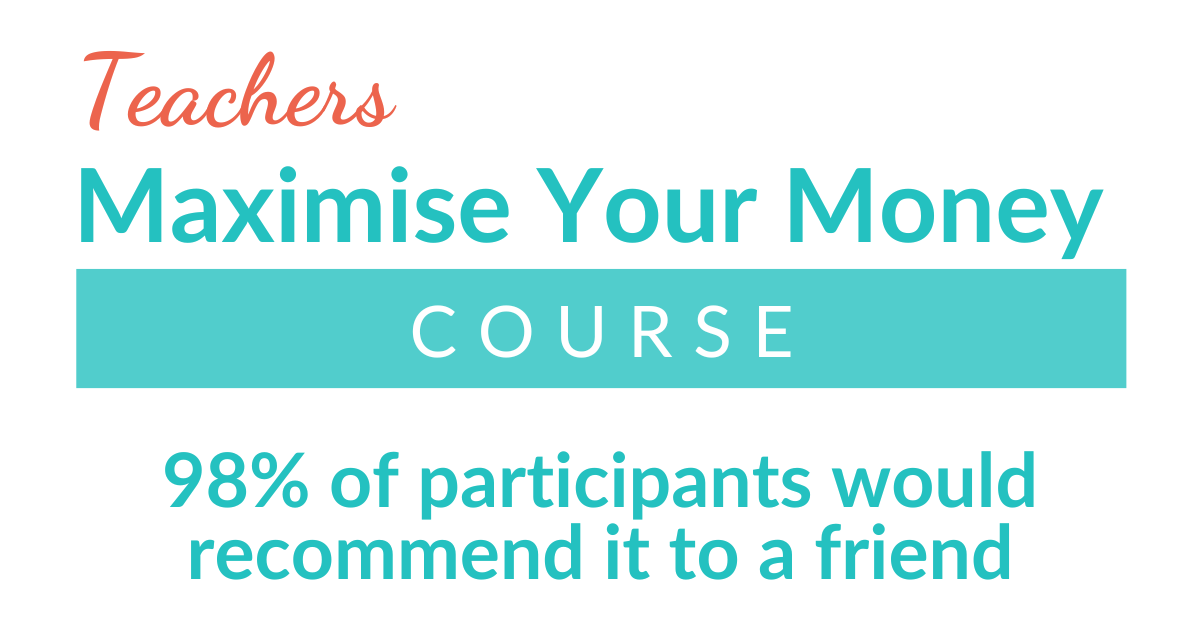Claim your freebie!
Financial Security for Teachers
- Release fears of the future
- Financially resilient & secure
- Provide great experiences for you and your family
- Enjoy life to the full now
Take a course!
- feel good about money, enjoy life more and feel like YOU again
- reduce stress levels & create time for you & your family
- pay off debt, make smart savings & build wealth
If a child’s attitude towards money is developed by the age of 7 is pocket money actually more important than we realise? Or is giving pocket money not necessary and just a complete waste of time?
With one in three parents today putting their financial security at risk to give financial help to their grown-up children, it is vital that your children learn about money from an early age.
There have been various debates over the years around kids and pocket money. How much to give? From what  age? Give pocket money for doing chores? Give pocket money, but expect certain tasks to be done as part of family life?
age? Give pocket money for doing chores? Give pocket money, but expect certain tasks to be done as part of family life?
There are really no right or wrong answers to the above – you will do what is right for you and your family.
What is important?
For me, what is important is that kids do get pocket money.
I think it is really important because it is the first step in teaching your child to be able to handle money effectively.
In our family, I wanted my kids to understand the value of money, by learning that couldn’t have everything that they wanted IMMEDIATELY, but that they could have what they wanted IF they had the money to pay for it.
By learning this message from an early age, I hope that they will grow up with a healthy attitude towards money and can use the money to their advantage. It will buy them the lovely things that they desire, but they will need to make some effort to be able to afford these things.
For me, these were the most important things about teaching my children about money.
1 Pocket money is theirs to spend as they choose
How would you like it if you were told what you could and could not spend your money on? I would hate it – it’s MY money, therefore I should be able to decide what I spend it on. (It’s just a pity most of mine gets spent on bills, food and children!)
Children see the world differently and therefore will make different choices about what is important to them. If they spend all their money on some crappy toy that lasts 2 minutes and ends up in the bin, I bet they will think twice before spending the next time.
However, if you refuse to let them buy it, then they still have a craving for this rubbish toy and will not have the opportunity to learn that it is actually a poor choice. It is good to try to educate them about getting good value for money and encouraging them not to blow it on ridiculous things, but not to control their spending.
They should be allowed to choose, make mistakes, learn from them and move on to make better decisions.
2 Encourage them to save something each month
 The best way I have found of doing this is by paying them interest on their savings. We set an interest rate of 10%, so that it was easy for the kids to work out how much interest they would get, and we paid it on the last Friday of every month. We always worked out the interest together, so that each child knew how much the others were getting in interest.
The best way I have found of doing this is by paying them interest on their savings. We set an interest rate of 10%, so that it was easy for the kids to work out how much interest they would get, and we paid it on the last Friday of every month. We always worked out the interest together, so that each child knew how much the others were getting in interest.
The first week was hilarious as child 1 was FURIOUS because, having blown all their money on crap, they got no interest!
Child 2 had saved a little and got some interest, and child 3 had saved a lot of their money and was rewarded with more interest.
It didn’t take long before they began to realise that they needed to find a balance between spending and saving and would think carefully before spending, especially in the run-up to interest week.
The only “problem” we then found was that they then became very good at saving for larger items, such as iPods and Xboxes. We capped piggy bank money at £100 and then it had to go into the bank – with hindsight I think I should have capped it much lower as some months we were paying a fortune in interest!
3 Gradually increase their level of responsibility
As they approached their teenage years, they always seemed to be looking for money for one thing and another, so I decided things needed to change.
At age 13 I asked them to make a list of all the things that they would need over a year and work out how much that might cost. We then discussed the list together and came up with a figure that we were both happy with. (I don’t think it is overly generous, but don’t tell them that, coz they are all happy with it!)
We then opened a cash card account and paid a monthly allowance. They are responsible for buying all their clothes (apart from school stuff), toiletries and days out with friends. This has encouraged them to think more carefully about what they buy.
eg: Branded hoodies were asked for as presents because they didn’t like spending that much of their own money on one item! Previously they were quite happy for me to spend that much of MY money on one item!
 Differences in attitude
Differences in attitude
At age 14 I added school dinner money onto the monthly allowance, to give her more money to be responsible for.
Around that time my first daughter got a part-time job and her wages also got paid monthly into the bank. She now manages her money really well and has recently changed her cash card to a debit card, hence the ASOS packages arriving here each week! She still likes to see her bank balance grow each month, but because she is working, she can afford to treat herself and I think that is brilliant!
When my middle daughter got her bank account she put all her birthday money into it too and loved the feeling of having money in the bank.
She then came to me one day saying “Mum, I need a job!” When I asked why, she said: “Well, I like to have money in the bank, but I also like spending, so I need to make money!” I just love that attitude and think it will stand her in good stead for the rest of her life.
It's not all good news though
My son, however, is a different story!
He has only just started to get an allowance because I felt I couldn’t trust him. Month one and he has wasted £20, by taking it out to buy deodorant. He admitted that he had spent £2 on deodorant and doesn’t know where the rest has gone – frittered on energy drinks and sweets I suspect!
He may well be demoted to pocket money and piggy banks again soon!
I am pleased with the way that our girls handle money, but if anyone has any suggestions for helping that blooming boy of mine I would love to hear them!
I hope that this has helped you to think about how you could introduce your children to money and how you can encourage them to be responsible and make good decisions about money from an early age.
If you would like to read more of my tips and suggestions please pop over to my Your Money Sorted Facebook group where you will find lots of info and friendly faces.
Eileen x
I am Eileen Adamson, a Your Money Sorted coach, working online with UK based female teachers, helping them to develop a better relationship with money. By gaining an understanding of how their personality affects the decisions they make, I can help them to implement changes which will allow them to feel calm, positive and confident that they are in control and making good financial decisions. I can then support them to put into place simple strategies that will allow them to manage their finances effectively on a daily basis and create a stable, secure and exciting future for themselves.









